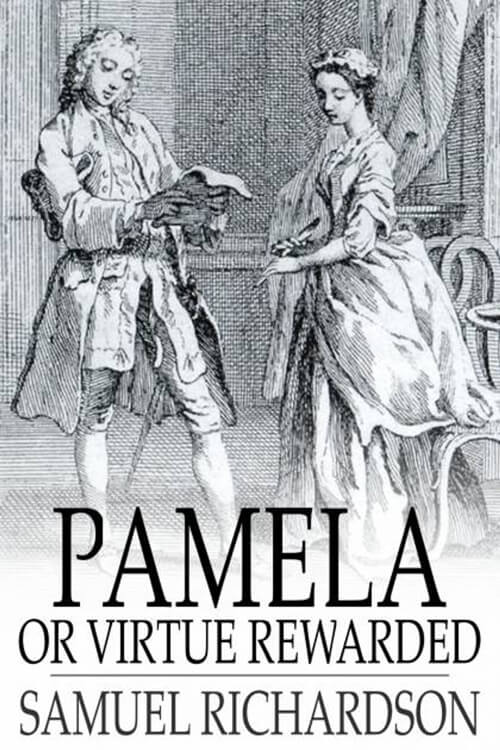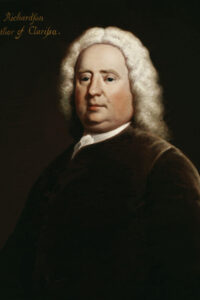
Pamela, or Virtue Rewarded
I have great trouble, and some comfort, to acquaint you with. The trouble is, that my good lady died of the illness I mentioned to you, and left us all much grieved for the loss of her; for she was a dear good lady, and kind to all us her servants. Much I feared, that as I was taken by her ladyship to wait upon her person, I should be quite destitute again, and forced to return to you and my poor mother, who have enough to do to maintain yourselves; and, as my lady’s goodness had put me to write and cast accounts, and made me a little expert at my needle, and otherwise qualified above my degree, it was not every family that could have found a place that your poor Pamela was fit for: but God, whose graciousness to us we have so often experienced at a pinch, put it into my good lady’s heart, on her death-bed, just an hour before she expired, to recommend to my young master all her servants, one by one; and when it came to my turn to be recommended, (for I was sobbing and crying at her pillow) she could only say, My dear son!—and so broke off a little; and then recovering—Remember my poor Pamela—And these were some of her last words! O how my eyes run—Don’t wonder to see the paper so blotted.
Well, but God’s will must be done!—And so comes the comfort, that I shall not be obliged to return to be a clog upon my dear parents! For my master said, I will take care of you all, my good maidens; and for you, Pamela, (and took me by the hand; yes, he took my hand before them all,) for my dear mother’s sake, I will be a friend to you, and you shall take care of my linen. God bless him! and pray with me, my dear father and mother, for a blessing upon him, for he has given mourning and a year’s wages to all my lady’s servants; and I have no wages as yet, my lady had said she should do for me as I deserved, ordered the housekeeper to give me mourning with the rest; and gave me with his hand four golden guineas, and some silver, which were in my old lady’s pocket when she died; and said, if I was a good girl, and faithful and diligent, he would be a friend to me, for his mother’s sake. And so I send you these four guineas for your comfort; for Providence…
Read or download Book
Samuel Richardson
Samuel Richardson (19 August 1689 – 4 July 1761) was an English writer and printer known for three epistolary novels: Pamela; or, Virtue Rewarded (1740), Clarissa: Or the History of a Young Lady (1748), and The History of Sir Charles Grandison (1753). He printed almost 500 works, including journals and magazines, working periodically with the London bookseller Andrew Millar. Richardson had been apprenticed to a printer, whose daughter he eventually married. He lost her along with their six children but remarried and had six more children, of whom four daughters reached adulthood, leaving no male heirs to continue the print shop. As it ran down, he wrote his first novel at the age of 51 and joined the admired writers of his day. Leading acquaintances included Samuel Johnson and Sarah Fielding, the physician, and Behmenist George Cheyne, and theologian and writer William Law, whose books he printed. At Law’s request, Richardson printed some poems by John Byrom. In literature, he rivaled Henry Fielding; the two responded to each other’s literary styles.
Biography
Richardson, one of nine children, was probably born in 1689 in Mackworth, Derbyshire, to Samuel and Elizabeth Richardson. It is unsure where in Derbyshire he was born because Richardson always concealed the location, but it has recently been discovered that Richardson probably lived in poverty as a child. The older Richardson was, according to the younger:
a very honest man, descended from a family of middling note, in the country of Surrey, but which has for several generations a large number of children, the not large possessions were split and divided so that he and his brothers were put to trades; and the sisters were married to tradesmen.
His mother, according to Richardson, “was also a good woman, of a family not ungenteel; but whose father and mother died in her infancy, within half an hour of each other, in the London pestilence of 1665”.
The trade his father pursued was that of a joiner (a type of carpenter, but Richardson explains that it was “then more distinct from that of a carpenter than now it is with us”). In describing his father’s occupation, Richardson stated that “he was a good draughtsman and understood architecture”, and it was suggested by Samuel Richardson’s son-in-law that the senior Richardson was a cabinetmaker and an exporter of mahogany while working at Aldersgate-street. The abilities and position of his father brought him to the attention of James Scott, 1st Duke of Monmouth. However, as Richardson claims, this was to Richardson senior’s “great detriment” because of the failure of the Monmouth Rebellion, which ended in the death of Scott in 1685. After Scott’s death, the elder Richardson was forced to abandon his business in London and live a modest life in Derbyshire.






